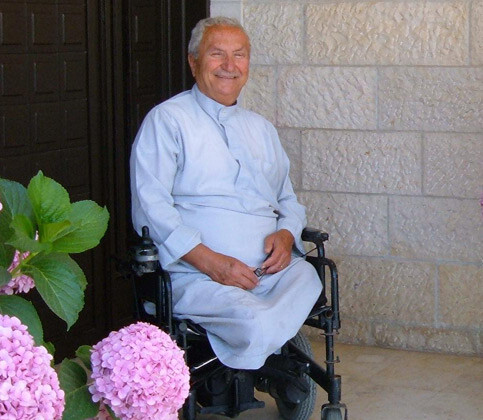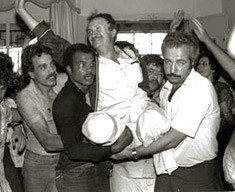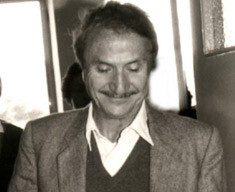The Electronic Intifada 29 August 2005

“Disengagement is a unilateral decision by Sharon. It is an attempt to impose solutions after the difficulties of the Oslo agreements and the Road Map. The Palestinian Authority is not capable of applying the conditions of the Road Map to stop Palestinian resistance. Israel is not willing to stop attacks against Palestinians and their rights.”
Former and last elected mayor of Nablus, Bassam Shaka, told The Electronic Intifada in an exclusive interview that the Palestinian Authority has tried to coordinate the disengagement with Israel without results. He expects that the Palestinian Authority will continue to try to coordinate further withdrawals “in order to get what they can” from Israel within the framework of the Oslo slogans.
Shaka has been a critic of the Oslo agreements, arguing they divided the Palestinian struggle for national independence into separate issues, thus dividing Palestinians and distracting attention from the national and human dimensions: “The Oslo agreements have left both sides disputing over the occupied territory and have given the security of Israel central importance. The construction of the Wall, along with other problems facing the Palestinians, will lead to the disintegration of the Palestinian cause as a national issue”.
The Declaration of Principles, signed between Israel and the PLO on September 13, 1993, launched the beginning of the Oslo peace process. The subsequent agreements, to be implemented in stages, did not mention the military occupation and postponed, until the final stage, negotiations over core issues of the conflict — refugees, settlements, borders and Jerusalem.
The Oslo process failed to address the imbalance of power between Israel and the Palestinians. Many thought that Oslo would lead to an end of the occupation and the establishment of an independent state. However, the process itself, and the absence of an effective enforcement mechanism, allowed Israel to continue land confiscations, house demolitions and territorial expansion, leaving Palestinians with little recourse. Israel continued to build settlements in the occupied territories and the number of settlers doubled in the West Bank during the years of the ‘peace process’.
The rebirth of the Oslo process in the Middle East Quartet-sponsored “Road Map” is not much better. While the Road Map calls for “reciprocal steps,” attention thus far has almost exclusively focused on what measures the Palestinian Authority is taking to crack down on Palestinian resistance.
Shaka says that the Palestinian cause must be centred on national independence and freedom by binding the Palestinian struggle to its national and human elements. “By this,” he said, “the Palestinian issue will be presented to the world with the required level and its true depth.” He says that the international role in causing the Palestinian tragedy should not be forgotten: “Its consequences still exist and still have effects.”
Shaka sees here a role for the Palestinian diaspora, saying “What is needed is the participation of Palestinians from the West Bank, the Gaza Strip and the 1948-occupied areas as well as Palestinians in the diaspora. They need to correct the national path and get the PLO back to its original role and refuse modifications to its original goals and activities.” Shaka says that Sharon’s “project” aims to implement the Oslo agreements from an Israeli perspective. “Our people must defend its presence, freedom and independence and we must insist that there will be no negotiations until Israel recognizes our national rights”.
In the 1980’s, Bassam Shaka was one of the most popular political figures in the West Bank. In November 1979, Shaka was jailed for allegedly making “inflammatory” statements in a private conversation with the Israeli military governor, and the Israeli government ordered him deported. But Israel’s Supreme Court overturned the decision and Shaka returned to a triumphant welcome in Nablus. Shortly after his release, a Jewish terrorist group, with the help of the Israeli army, booby-trapped the mayor’s car with explosives. Barely escaping with his life and gravely injured, Shaka’s legs were amputated.


In March 1982, Israeli authorities removed him and other elected mayors from office and replaced them with Israeli military officials. These dismissals, along with deportations of two other mayors, seemed to severely curtail the Palestinian national leadership in the occupied Palestinian territories, which Israel had been seeking to replace with new leaders that it regarded as moderate.
Asked whether he would ever join the Palestinian cabinet, Shaka responded, “Of course not. I am one of the opponents of the Oslo agreements. The Palestinian Authority abides by those agreements because they signed it. It is known that the content of the agreements are in contravention of freedom and the national objectives of our people.”
Referring to the upcoming elections, Shaka said, “The purpose of the elections is to commit to the Oslo agreements, while the Palestinian national agenda opposes Oslo.” Shaka says that despite the success of Western governments to impose Oslo as a de facto policy, it did not get the necessary legitimacy.
According to Shaka, the Oslo agreements contradict the rights and national interests of the Palestinian people. This caused accumulating problems and complications for these agreements.
Shaka says that the elections are subject to different measures that may give the elections an appearance of being free. “If all people took their unified stance to face the challenges, I doubt that these elections will even take place,” he said.
In November 1999, Shaka was among twenty prominent Palestinians who signed a petition criticizing corruption and human rights abuses of the Palestinian Authority. In a bid to quash direct criticism of the Palestinian Authority, the late Palestinian president, Yasser Arafat ordered their arrest, and eight Palestinian legislators who also signed the petition faced the threat of losing their parliamentary immunity.
The so-called “Petition of Twenty” called Yasser Arafat’s authority “corrupt, unjust and manipulative”. Shaka was placed under house arrest. The petition also criticized the Oslo agreements, saying that after several years the Oslo process had brought only more settlements, more land confiscation, and more Palestinian prisoners.
“The homeland is being sold,” the petition read. “We must stand together to stop this corruption.” Shaka said the petition was an eye-opener for the people. “When we signed the petition, the goal was to get the ordinary person to think,” Shaka told reporters at the time.
Shaka says that the current cease-fire has not been respected by Israel. “Israel is carrying out assassinations, detentions, destruction and slaughter, while the Palestinian Authority is calling the resistance to calm down despite these Israeli measures. This exposes, in an obvious way, the goals of this ceasefire, namely, imposing Israeli and American visions and also demonstrates how the Authority continues to follow the Oslo agreements,” he said.
Shaka sees the occupation as one of the most crucial problems Palestinians face today. He also refers to problems such as “corruption, division, lack of security and the absence of the values that reflect a deeper suffering of our nation due to the absence of national unity to defend our rights.” He does not think the Palestinian Legislative Council can perform a critical role.
“We would have reduced much pain, disagreements and contradictions if the Palestinian Authority had reflect on its policy in a critical way. What is important is that public opinion finds its way to the Legislative Council. The Palestinian Authority has not given any value to the existing council. Its presence is nothing more than decoration.”
Arjan El Fassed is a cofounder of the Electronic Intifada. Ghadir Shaka helped with translation, and Amal Awad and Nigel Parry helped with editing of this interview.





